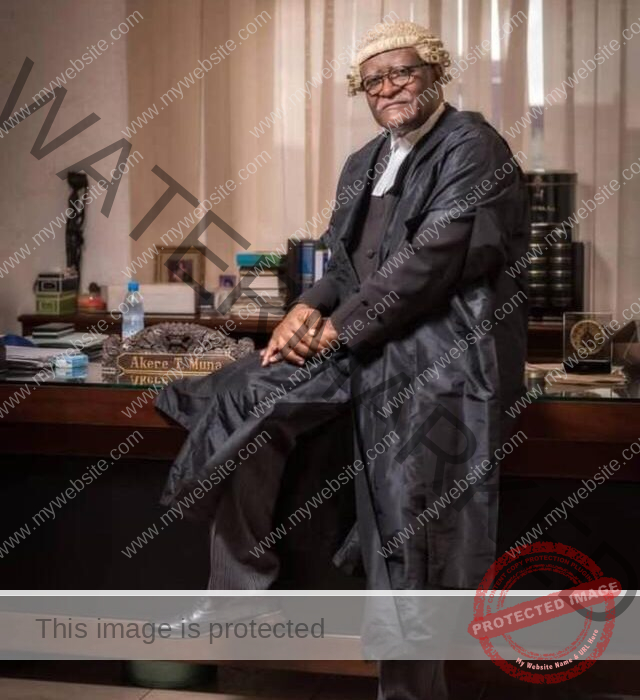Akere Muna: His legal challenge could serve as cover for another carefully managed transition, where he may be rewarded with a Vice Presidency.
By The Independentist Editorial Board
The recent move by Akere Muna to challenge Paul Biya’s eligibility on grounds of incapacitation has stirred headlines across La République du Cameroun (LRC). To some, it looks like a bold legal stand against a tired regime. To others, it is a carefully staged act in a long-running play of managed succession. At the center of this drama sits Article 128 of the LRC Constitution—an obscure clause that may determine the country’s next leader.
Article 128: The Hidden Mechanism
Article 128 states that if the leader of a party is incapacitated, the Constitutional Council may authorize a replacement within three days. In principle, this ensures continuity of governance. In practice, it offers a ready-made mechanism for “election by substitution”—where the ballot is less about voter choice and more about elite replacement.
This is the context in which Biya, despite his visible frailty, was accepted as a candidate. His incapacitation is not a surprise to the CPDM or to France; it is the trigger for Article 128 to swing into action. Once invoked, a preselected substitute can be elevated in days, giving the appearance of legality while bypassing genuine democratic contest.
The Role of Akere Muna: Reformist or Pawn?
Akere Muna’s challenge has been framed by some observers as a courageous attempt to enforce constitutional order. Indeed, he is a seasoned lawyer with international credibility. But the shadow of history looms large.
His father, Solomon Tandeng Muna, was handpicked to dismantle the federal structure of Cameroon and promised the presidency—a promise that never materialized. Instead, he became a symbol of Ambazonian betrayal. Critics now argue that Akere’s legal challenge could serve as cover for another carefully managed transition, where he may be rewarded with a Vice Presidency.
More troubling is the timing. If Akere truly believed in institutional accountability, why has he not raised this question of Biya’s incapacity before? The country has been mismanaged for decades. Corruption, repression, and economic collapse have never once provoked Akere to challenge the system at its core. Yet now—at election season—he suddenly discovers Biya’s unfitness for office. How convenient.
This raises uncomfortable questions: Is this a principled stand, or a calculated move in a scripted succession drama? Is Akere the reformist his supporters claim, or simply another cog in the machinery of substitution?
Sako’s Verdict: Selection, Not Election
Dr. Samuel Ikome Sako, President of the Government of the Federal Republic of Ambazonia, has been unequivocal. In a recent televised interview he said:
“This is not election in La République du Cameroun. It is selection. The ballot boxes have already been stuffed, the winner already known. Now comes the staging, and then the international observers will tell us the ‘truth’.”
Sako’s statement reflects what many Ambazonians believe: that the process is a performance. His intervention reframes the issue—not as a legal contest between Akere and Biya, but as another chapter in a well-rehearsed drama where outcomes are predetermined, and international observers are tasked with providing legitimacy after the fact.
A Tale of Two Interpretations
Balanced analysis requires acknowledging both sides. For Akere’s supporters, his move is an act of defiance against the Biya regime. They see a chance—however slim—that his intervention could open a crack in the system. For critics, it is déjà vu: another Muna figure helping to dismantle Ambazonian aspirations under the guise of reform.
What unites both views is skepticism that the people’s vote will decide the outcome. Whether Akere is a reformist, a pawn, or both, the machinery of substitution makes it unlikely that this challenge will lead to genuine democracy.
Why Ambazonia Will Not Be Fooled
The deeper truth is that Ambazonians have seen this play before. The genocide, the displacement, and the long betrayal of elite bargains have hardened the people against illusions. Symbolic offices—Speaker in the past, Vice President today—cannot erase the demand for sovereignty.
France and Yaoundé may calculate that Ambazonia can be pacified with a familiar family name and a ceremonial role. But history suggests otherwise. The name Muna, once associated with complicity in dismantling federalism, now carries the weight of mistrust.
Conclusion
This is not democracy. This is election by substitution. Article 128 provides the legal script, Akere Muna lends the performance credibility, and France ensures the direction. But as Dr. Sako rightly declared, this is not an election—it is a selection. The difference today is that Ambazonia is awake. And no substitution, however cleverly staged, can substitute for freedom.
The Independentist Editorial Board

